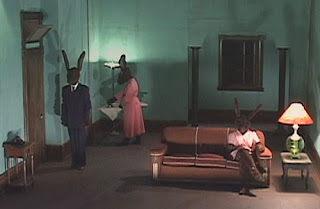Carl Jung Would Hate Inland Empire (Movie Review) by Alison Ross

There are two types of people in this world: Those who revere David Lynch, and those who revile him. Those in the latter category can french kiss my derriere.
I mean, how can you NOT nurture an absolute reverential awe for this Sultan of the Surreal? We're not worthy, indeed!
But then again, not everyone "gets" zany incongruity in art nor appreciates when a film is thoroughly hijacked by esoteric hijinks. And who could blame them? It takes psychological fortitude to decode imagery that evokes a mescalin sojourn in the New Mexico desert.
Inland Empire is not, then, for those composed of a fragile constitution. It is Lynch's trippiest mind-fuck, and that's saying a lot, considering the bulk of his oeuvre is pretty hellishly hallucinatory. Most of his movies, however, are a blend of the straightforward and the surreal, whereas Inland Empire is just stuffed and suffused with surrealism. It's a three-hour descent into a dark dream dimension that can only be accessed through the hidden portals of that secret psyche known as the subconscious.
Most of Lynch’s films, in other words, have accessible elements that keep more mainstream audiences intrigued enough to endure and even appreciate the less accessible elements. And of course the cryptic content is what keeps the more challenge-hungry film viewers interested. In fact, that is Lynch’s genius – weaving compelling concrete stories which feature freaky fantastical flourishes that cultivate a tangible tension between the real and the surreal.
And it’s what defines Lynch’s movies as treading a very fine line between mainstream and obscure fare. His movies are lucidly luminous and luridly impenetrable simultaneously… and just when you think you understand the explicit parts, you are assaulted with ambiguous imagery that obfuscates that lucidity, and just when you think things could not get more unintelligible, transparency returns, as if nothing happened in the interval.
Inland Empire, though, offers no such respite from the disorienting dream antics. To submerge yourself into the world of Inland Empire is like embarking on a night of drug-fueled debauchery and then taking a suicidal leap into a giant Goya black period painting.
Like its predecessor, Mulholland Drive, Inland Empire concentrates its commentary on Hollywood, but whereas Mulholland was a bit airier owing to its reliance on the aforementioned dichotomy between the real and the surreal, Inland is suffocatingly surreal, and the crux of the commentary can be difficult to discern. But the main thrust, of course, is that Hollywood corrupts. Big surprise there.
The story concerns Nikki, played by perennial Lynch favorite Laura Dern. She plays an actress starring in a movie based on a Polish gypsy folktale. There was an original movie, actually, but the filming of it was aborted because the leading actors were caught up in a fatal adulterous affair. And life begins to mimic art when Nikki her co-star, Devon, launch a perilous extramarital relationship of their own.
Of course, true to Lynchian form, the film is adorned by all manner of bizarrely unorthodox and seemingly unconnected events and characters: a woman bent on murdering someone with a screwdriver; a sitcom starring talking rabbits (who are actually just humans in bunny suits); musical prostitutes; and so on. You get the idea.
In Lynch’s mind, these events and characters are related to the story, but peripheral to the primary scenario. And if we are in synch with the Lynchian mentality, we too can implicitly understand their purpose, as it were, even if we cannot explicitly articulate it.
And that is the baffling beauty of this film and all of Lynch’s films, ultimately: the fact that the “unintelligible” elements are intuitively apprehended.
This is what is most crucial to understand about the Lynchian Cinematic Experience: It's not about being able to intellectualize about his films, it's about being able to LET GO of intellectualizing about them.
Sure, one can and will dig for deeper symbolic import upon viewing one of his movies, and sure, perhaps there are hierarchies of meaning to extract - or not. But it's far more "rational" to be irrational about the films, to forego reason altogether and relax into the more fluid logic-vernacular of dreams.
After all, when you are actually in a dream state, experiencing actual dreams, things have a certain "sense" to them that evaporates when you awaken. So it goes with a Lynch film: while you are watching one, you are fused with the moment, instinctively aligned with the jumble of asymmetrical juxtapositions and illusory imagery therein.
But as soon as you try to put your mental finger on what it all "means", the ideas that you so vividly discerned dissipate with the utterance of your first syllable. You become verbally impotent because, after all, dreams rebel against reason, and often to verbalize something is to rationalize it.
So you have been duly warned about Inland Empire. Even though there is, actually, a viable narrative threading throughout the film, it is cluttered and obscured by jolting incongruous, chimerical imagery that will quite possibly subvert your sanity. Do not try to decipher it; allow it instead to sink seductively into your subconscious, where it already resides.
For Lynch is the anti-Jung, prodding us not to interpretively deconstruct our dreams, but to take them at face value, symbology and mythology be damned.











No comments:
Post a Comment